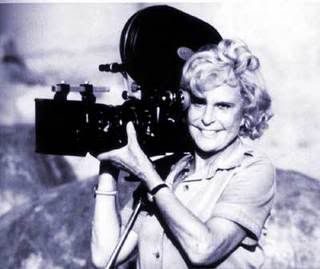
If you've ever seen Triumph of the Will or Olympia, you've probably wondered about their mysterious, reclusive maker. Leni Riefenstahl rose to prominence in pre-Nazi Germany with her strapping, sexy starring roles in Arnold Fanck's heroic "mountain" movies. Having given up acting in 1933, she resolved to turn her energies to directing films. Her reading of Adolf H.'s prison memoir Mein Kamph was a revelation. "I became a confirmed National Socialist after reading the first page," she wrote in her memoirs. "I felt a man who could write such a book would undoubtedly lead Germany. I felt very happy that such a man had come."

Her film of Hitler's 1933 Nuremberg Nazi rally, Victory of Faith remains little-seen. But, turns out, it was just a trial run for yet another go at recording a gathering of jackboots. In 1934, she shot Triumph of the Will with discernible passion. Even though it was obviously documenting the beginnings of worldwide calamity, this true believer made Hitler's arrival on the world stage look as welcome as the Second Coming, and few Germans at the time would have objected to this view. Check out how Hitler's plane comes zooming out of the dramatic grey-white clouds, or the epic craning of the camera over the throngs, or the impossibly uniformed lines of soldiers and swastikas. She adored this Hitler dude, and helped make him the monster he became.
She went on to record her reeling ode to Aryan physical beauty and athleticism, Olympia at the 1936 Berlin Olympics, thus sealing her international reputation, even among disgusted Nazi-haters, as the first notable female film director (watch the Olympics today and you will still see shooting techniques that she pioneered). She continued to support Hitler all through the war, and he returned the favor by bankrolling her increasingly lavish productions.

Once the war had ended, Riefelstahl found herself imprisoned in a French detainment camp. Upon her release, she continued to try and make films, but her support of the Nazi carnage shot her chances for funding, so she concentrated on still photography, and thereby sank into a notorious obscurity. That is, until she agreed to sit with director Uli Wertzel for 1994's The Wonderful, Horrible Life of Leni Riefenstahl. Wertzel is a lucky beneficiary of the 90-year-old's misused talent and undeniable charisma. Regarding the Holocaust, Wertzel catches her parroting that tired old "we didn't know anything about it" excuse guilty Germans handed the world. Her onscreen contention that artists cannot be political is a jaw-dropper, but is also bizarrely understandable given the abstracted virtuosity displayed in Triumph and Olympia.

Clips from her small but significant body of work serve as centerpieces to this long, grand documentary, though the footage of the middle-aged Riefenstahl filming native tribes in Africa and, then at 88, shooting underwater films of marine life are easily as intriguing. In particular, I loved the hilariously arrogant scenes where she directs the director, decrying his shot set-ups and, while talking and walking, complaining that she can't talk while walking. Wertzel's controversial celebration of this notable but terribly misled filmmaker is a supremely satisfying look at the life in art and the art of a life.
2 comments:
The loot was provided by the Londinium Central bankers..not the jews..Please do not puppet the propaganda and do the requisite research.
Thanks.
Someone has to straighten this prevaricating mess out..one issue at a time.
Randy
One of the most preposterous and wonderful things I ever perpetrated as a television programmer was running "Olympia" on primetime Los Angeles television at the time the city was in the throes of its Olympic Games mania back in 1984. I still can barely believe I got that one through! :-) Those were the days!
Post a Comment